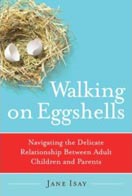Our son and his girlfriend are living at our house, part-time, for the next several months until they
head off to Asia to teach English for a year. Clearly he’s in a transitional stage and must have
thought it would be a good idea to educate his parents about the best way to navigate this new phase of
our relationship. So he came home from the library with a copy of Walking
on Eggshells. Fair enough. Our son’s giving us this book reflects the way we brought him
up… when something’s on your mind, speak up and get your needs met. Bravo!
So I read Walking on Eggshells and
read chunks of it to my husband, David. It stimulated lots of conversation between us as parents of a new
college graduate. It also inspired an important family
meeting in which our son, his girlfriend, David and I discussed the give and take of living together
in peace.
We had a really nice summer… and part of the ease came from the principles in Eggshells.
I’ll pass them along to you:
On Advice:
They don’t want to hear it.
They don’t hear it.
They resent it.
Don’t give it.
They resent it when parents meddle and are distressed when parents try to fix everything ASAP. When they feel they are being judged, they become even harsher judges (of us).
—Jane Isay
Jane Isay interviewed nearly 100 parents and as many “adult children” (How’s that for
an oxymoron?) Her retelling of their personal stories
made this book very engaging. These are real parents and real sons and daughters, struggling with their
relationships. Some were botching it up royally and some were enjoying a new level of mutual respect and
appreciation for one another. The degree of success was directly connected to the parents’ willingness
to back off and let their kids live their own lives.
Most of you have middle and high school age kids. The last thing you may want to imagine is life as an “empty
nester.” But even for parents whose kids are a decade or more away from college graduation, this
book offers an opportunity to think about the kind of relationship you want with your kids when they do
grow up.
To help you figure out what direction you’d like to go in and where you’d like to end up,
Walking
on Eggshells will inevitably force you to reflect on the relationship you had with your parents
as you transitioned into adulthood. How do you think about that relationship today? If there are aspects
of it you’d rather not duplicate with your own adult child now’s the time to lay the groundwork
for change. This book can definitely help.
More Recommended Parenting Books »




